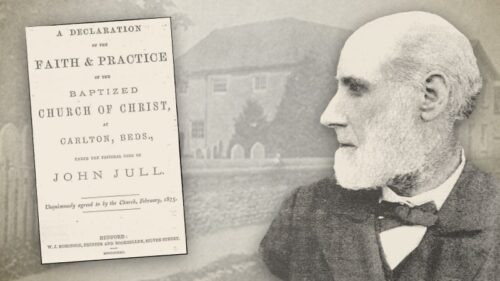-
Introduction
John Piper has served as the pastor of Bethlehem Baptist Church, Minneapolis, Minnesota for more than 30 years. In 1994, an organization called “Desiring God” grew out of John’s tape ministry. It is now “an international web ministry with 12,000+ free resources and 3.5+billion monthly users.” Desiring God hosted a conference for pastors in 2007. John Piper spoke on the life and ministry of Andrew Fuller, as it relates to his “broadsides Against Sandemanianism, Hyper-Calvinism, and Global Unbelief”. The title of his lecture was, “Holy Faith, Worthy Gospel, World Vision”. The audio lecture and full transcript may be accessed here: There are many areas one may benefit from Piper’s teachings, but this is not one of them. Having failed to understand the framework of…
-
1. High-Calvinists Did Not Like George Whitefield, Because He Preached The Gospel?
Speaking of John Wesley and George Whitefield, John Piper points out: “The Particular Baptists did not like either of these evangelical leaders. Wesley was not a Calvinist, and Whitefield’s Calvinism was suspect, to say the least, because of the kind of evangelistic preaching he did. The Particular Baptists spoke derisively of Whitefield’s ‘Arminian dialect’.” One of the leading figures among the Particular Baptists was Pastor-Theologian John Gill. The teachings of Gill are representative of the High-Calvinism to which Piper refers. In George Ella’s book, “John Gill, And The Cause Of God And Truth”, he makes the following observation on page 184: “It is very difficult to conceive that anyone familiar with the ministry of John Gill could accuse him of being without vigour in preaching…
-
2. As A High-Calvinist, John Gill Was Responsible For Killing A Gospel Spirit Among The Particular Baptists?
John Piper asserts: “Fuller himself certainly saw Gill as a High Calvinist responsible for much of the evangelistic deadness among his fellow Particular Baptists.” There is an article written by George Ella called, “Exaggerated Claims Concerning Andrew Fuller And False Information Regarding ‘High-Calvinists’”. Ella points out: “1795-1835 was a time of widespread revival with Anglican Robert Hawker preaching to thousands, Independent William Huntington equalled his efforts and Baptist William Gadsby founding 45-50 churches filled with new converts. The Particular Baptists were not inactive in this time but Mr Cook confuses Gill’s orthodoxy with Fuller’s. Gill had one of the largest Particular Baptist congregations in Britain, outnumbering Fullers by far. Contemporary evangelical magazines objecting to Fullerism’s ‘gangerous’ effect on church growth were legion. However, in…
-
3. The High-Calvinist Churches Were Lifeless And The Particular Baptists Were Dying?
John Piper points out: “One of Fuller’s critics, John Martin, Pastor at Grafton Street, Westminster wrote, “Sinners in my opinion, are more frequently converted, and believers more commonly edified, by a narrative of facts concerning Jesus Christ, and by a clear, connected statement of the doctrines of grace, and blessings of the gospel, than by all the expectations and expostulations that were ever invented. (Quoted in Morden, Offering Christ, p. 57.) But in fact, the Hyper-Calvinists were not passionately telling the narrative of the gospel story to the lost and were opposed to the new mission to India. Peter Morden points out that “The prevalence of high Calvinism had led not only to a refusal to ‘offer Christ’ but also to a general suspicion…
-
4. Particular Baptist Hyper-Calvinist Churches Were In Decline During The Seventeenth Century?
In an effort to ‘prove’ the killing effects of High-calvinism, John Piper directs attention to the decline of the Particular Baptist churches between 1718 and 1760: “Fuller, who only knew High Calvinism in his early ministry, said in 1774, “I . . . durst not, for some years, address an invitation to the unconverted to come to Jesus” (Quoted from John Ryland’s biography in Ibid., p. 103.). He went on to say, “I conceive there is scarcely a minister amongst us whose preaching has not been more or less influenced by the lethargic systems of the age” (Works, Vol., II, p. 387.). The price had been huge: in the forty years after 1718; the Particular Baptists declined from 220 congregations to 150 (Morden Offering…
-
5. The Atonement Of Christ Is Sufficient In Its Worth To Save The Non-Elect?
John Piper subscribes to the view that the atonement of Christ is sufficient in its worth to save the non-elect, but efficient in its application to save only those who believe. This gobbledygook is derived from the teachings of Andrew Fuller, who sought to retain the free offer of the gospel, while subscribing to the doctrine of Particular Redemption. To that end, Fuller argued that the atonement of Christ is universal in its value, capable of covering the sins of the entire human race (elect and non-elect). He also maintained that the atonement is particular in its application, covering only the sins of those who savingly believe on Christ. In this way, Fuller could sincerely offer the gospel to the non-elect, for he believed…









